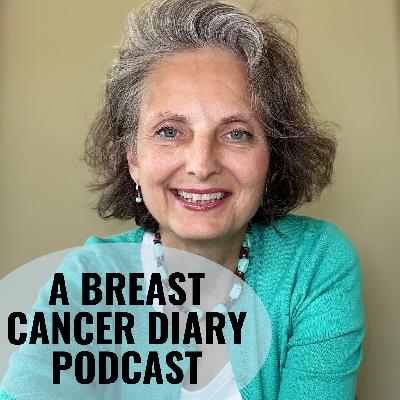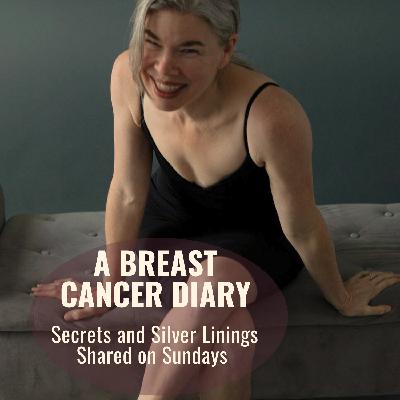Thriving with Metastatic Lobular Breast Cancer: Leslie Pifer-Pien
Description
My friend and fellow lobular breast cancer awareness advocate, Leslie Pifer-Pien joined me on the podcast this week to talk about her first seven years as a metastatic invasive lobular breast cancer patient. Leslie was diagnosed de-novo, which means, she didn't start with the mild kind of cancer but went straight to stage four, or "metastatic" cancer. She's taken it in stride, but finding the right oncologist isn't easy with Lobular Carcinoma. Lisen in as we chat about all that she's learned.
Transcript:
K:
My guest today is my friend and local advocate, Leslie Pifer-Pien, who lives in Camas, Washington. She was diagnosed in May of 2017 with de novo metastatic breast cancer—lobular breast cancer. And she has a history of working as an electrical engineer as well as a college professor here in the Portland area with exchange students.
Leslie and I just met about a year ago, and we worked together on the local advocacy teams with the Lobular Breast Cancer Alliance as local advocates, meant to be working in person together. But most of our contacts have been online still, but we did meet on national or global Lobular Awareness Day a couple of weeks ago for the first time in person. And that's when Leslie agreed to come on the podcast.
Leslie is my first guest who is a metastatic breast cancer patient. I've been trying so hard to get my various friends who are metastatic to come on and they have all tried, but things have come up and gotten in the way. And I'm sure I'll have many more guests who are metastatic, but it's really important to me to feature the stories of patients who are metastatic because we just don't hear their stories often enough in the breast cancer community and I just feel that they are so, so very important. So thank you, Leslie. It is a vulnerable act to come on and speak about this journey. And I know you have a very unique one to share about. So thank you so much for being here. It means a lot to me.
L:
You're welcome. Thank you as well.
K:
Well, I wanted to ask you a little bit about your experience of discovering, without the medical professionals discovering, that you had breast cancer. And I know this was, not a typical way of discovering and I know that you're a spiritual person and I love to talk about spirituality on the podcast.
So I'd love for you to tell the wild and crazy story of how you came to suspect that you had breast cancer.
L:
Wow. Thank you. Because it's still a surprising story to me now, seven plus years later! I had gone for a mammogram like everyone else and I was called back, which wasn't surprising. I knew I had dense breasts. My sisters get called back. So they did a call back and they said, Oh, it's perfect. Everything's fine. And I got my piece of paper saying normal mammogram results. But then I had this experience that I, I don't know quite how to explain. Every day I'd go in the shower and this voice would come to me and say, “you have breast cancer… but on the right hand side” and it would, I would listen to it for the 15 minutes I was in the shower. I’d forget about it. And the next day would happen again. And then all of a sudden, five, six, seven days, I'm like, my goodness, the same thing is happening over and over again. I think you might need to listen! And having a scientific background, like you said, I had been an engineer originally.
I was looking for others to validate it. So I showed anyone who was willing to look at my breast. “Do you see anything? Is there any reason I should have breast cancer?” And everyone would look, I seemed like I, I was kind of crazy, like, no, there's nothing wrong. But I couldn't get the thought out of my head. It was so strong, the feeling, that I finally went to emergency, urgent care. And I don't know why I chose urgent care. I was just like, here I come. I got my courage up and I said, I have a normal mammogram. They called me back on my left hand side, but I think I have it on the right hand side. And the woman listened, the doctor listened and called me in for some extra testing, in which they did an ultrasound, they finally looked like they could see some cancer, but it was early stage, they said. So I left all happy, well, not happy, maybe relieved, right? Okay, thank goodness it's not metastatic. And then when I went to see a surgeon for my mastectomy, he said, “Oh, you're kind of swollen. Your lymph nodes don't seem good.” And then they did a breast MRI and some bone biopsies and found out I indeed was metastatic.
K:
So why did they do the bone biopsies? Were you having pain already in your bones?
L:
I was... so when they did the ultrasound, the funny thing is I'm like, “Oh, please brace my body.” I did have back pain. It had been the first time in my life ever. So I don't really know what that experience is like, but I wanted them to bolster my body. But you ask why did they do a bone biopsy--it’s because sometimes you have a different type of cancer in your body and they wanted to validate that. Yes, I have breast cancer and it’s what is in my bones. Because they saw it.
K:
Oh, okay. It lit up on the MRI.
L:
Well, my chest lit up, so they knew it was other places, like in the ribs…. Oh, and then they did a PET scan, and they saw it was through the rest of the spinal system, but they needed to validate what they see on the PET scan and the MRI was indeed breast cancer, and so they strongly suspected it had traveled already when they did that bone biopsy.
K:
Okay. And then your, your journey took you to a few different oncologists just based on the fact that you had lobular—you were doing a lot of your own research and you were looking for a better and a better second and third opinion and eventually you found it. What was that like when you found your, your better oncologist that gave you the treatment that you're now working with?
L:
Do you know there was such a sense of stress that I could feel in my body that I was constantly trying to put myself in some ways in medical school. I was trying to do online research and try to understand because I was aware that these well educated doctors, well meaning oncologists, didn't have the information they needed and I was concerned that I was not being cradled as much as I needed to be.
I think they were doing everything they could and I think they were wonderful people. So I don't mean that as an insult against them, but they just don't know enough about lobular. And, the second oncologist, I mentioned to her, maybe I want to see this doctor up in Seattle who's a specialist. And she actually was wise enough to realize she didn't know enough. And she contacted the specialist up in Seattle and talked to her. And they talked about my case, and I went up to see her too. And the sense of needing to research every morning, these two hours of, “what do I need to know about breast cancer?” Poof. That that stress is gone. It feels really good to be in the hands of someone who knows.
And also, there's a lot less fear because I had developed what is called the ESR1 mutation which tends to sound super scary and people say you have to be on this one drug and only this one drug, but you can't take another, it can't work in conjunction with another drug and it's overall survival is relatively small…. So I'm like, it doesn't sound so good. And this doctor that I'm seeing in Seattle had so much knowledge. She's like, “do you know what? I think we have other drug choices that will work for you. And I've seen this enough that even this ESR one mutation may revert back. Let's not get crazy about this.” And so there was a sense that she had from treating patients, from working in research that really, allowed me to feel a lot more peaceful.
K:
How many years? Through your experience, did it take to find this, this new oncologist that you're working with now?
L:
So I had spied her through some online conferences and I realized, Oh, that's a doable distance because Seattle from where we are here is maybe three and a half hours. I mean, not ideal, but it was, it was doable. It wasn't like getting in on an airplane and having to get there. But it wasn't until I had an oncologist who admitted she didn't know enough to really help me that I started the search.
But getting in with this doctor was a long waiting process. Well, five, six months.
K:
Oh, wow. Okay.
L:
You know how every month you feel so vulnerable. You're like, Oh, what if I don't get my treatment. But I think also this doctor realizes lobular tends to move very slowly. And she had looked over my paperwork enough and seen it. And also I think she's that kind of a busy woman that I was really thankful to be able to get into with her on any basis.
K:
And







